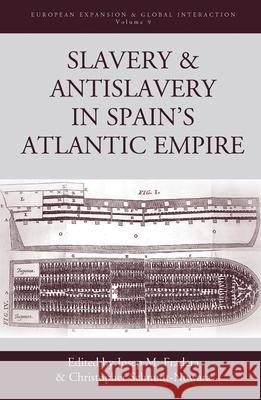Slavery and Antislavery in Spain's Atlantic Empire » książka
Slavery and Antislavery in Spain's Atlantic Empire
ISBN-13: 9781785330261 / Angielski / Miękka / 2015 / 340 str.
Slavery and Antislavery in Spain's Atlantic Empire
ISBN-13: 9781785330261 / Angielski / Miękka / 2015 / 340 str.
(netto: 130,37 VAT: 5%)
Najniższa cena z 30 dni: 135,22
ok. 30 dni roboczych.
Darmowa dostawa!
" I]nnovative, well-organized, thoroughly-researched, and engagingly written collection. All contributions are informed by the most recent relevant historiographies as well as by pertinent theoretical literature. The book represents an original and significant contribution to an under-studied topic: the history of slavery, plantation slavery, and abolitionism in the Spanish imperial system." - Jesus Cruz, University of Delaware " A]n important and timely volume, with an all-star cast of contributors from many countries, each approaching the topic of Spanish abolitionism from a different angle." - Kris Lane, Tulane University "This is an outstanding volume that addresses and analyses a significant set of questions in the history of slavery and the history of colonial and post-independence Latin America...The editors and authors deal eloquently and effectively with the current concepts and methodologies in slavery and Ibero-American studies." - William D. Phillips, Jr., University of Minnesota African slavery was pervasive in Spain's Atlantic empire yet remained in the margins of the imperial economy until the end of the eighteenth century when the plantation revolution in the Caribbean colonies put the slave traffic and the plantation at the center of colonial exploitation and conflict. The international group of scholars brought together in this volume explain Spain's role as a colonial pioneer in the Atlantic world and its latecomer status as a slave-trading, plantation-based empire. These contributors map the broad contours and transformations of slave-trafficking, the plantation, and antislavery in the Hispanic Atlantic while also delving into specific topics that include: the institutional and economic foundations of colonial slavery; the law and religion; the influences of the Haitian Revolution and British abolitionism; antislavery and proslavery movements in Spain; race and citizenship; and the business of the illegal slave trade. Josep M. Fradera is Professor of History at the Universitat Pompeu Fabra and the author of La nacion imperial. Derechos, representacion y ciudadania en los imperios de Gran Bretana, Francia, Espana y los Estados Unidos (2015). Christopher Schmidt-Nowara was Professor of History and Prince of Asturias Chair in Spanish Culture & Civilization at Tufts University. He was at work on a translation and edition of Joseph Blanco White's Bosquexo del comercio en esclavos.
"[I]nnovative, well-organized, thoroughly-researched, and engagingly written collection. All contributions are informed by the most recent relevant historiographies as well as by pertinent theoretical literature. The book represents an original and significant contribution to an under-studied topic: the history of slavery, plantation slavery, and abolitionism in the Spanish imperial system." · Jesus Cruz, University of Delaware"[A]n important and timely volume, with an all-star cast of contributors from many countries, each approaching the topic of Spanish abolitionism from a different angle." · Kris Lane, Tulane University"This is an outstanding volume that addresses and analyses a significant set of questions in the history of slavery and the history of colonial and post-independence Latin America...The editors and authors deal eloquently and effectively with the current concepts and methodologies in slavery and Ibero-American studies." · William D. Phillips, Jr., University of MinnesotaAfrican slavery was pervasive in Spains Atlantic empire yet remained in the margins of the imperial economy until the end of the eighteenth century when the plantation revolution in the Caribbean colonies put the slave traffic and the plantation at the center of colonial exploitation and conflict. The international group of scholars brought together in this volume explain Spains role as a colonial pioneer in the Atlantic world and its latecomer status as a slave-trading, plantation-based empire. These contributors map the broad contours and transformations of slave-trafficking, the plantation, and antislavery in the Hispanic Atlantic while also delving into specific topics that include: the institutional and economic foundations of colonial slavery; the law and religion; the influences of the Haitian Revolution and British abolitionism; antislavery and proslavery movements in Spain; race and citizenship; and the business of the illegal slave trade.Josep M. Fradera is Professor of History at the Universitat Pompeu Fabra and the author of La nación imperial. Derechos, representación y ciudadanía en los imperios de Gran Bretaña, Francia, España y los Estados Unidos (2015).Christopher Schmidt-Nowara was Professor of History and Prince of Asturias Chair in Spanish Culture & Civilization at Tufts University. He was at work on a translation and edition of Joseph Blanco Whites Bosquexo del comercio en esclavos.











